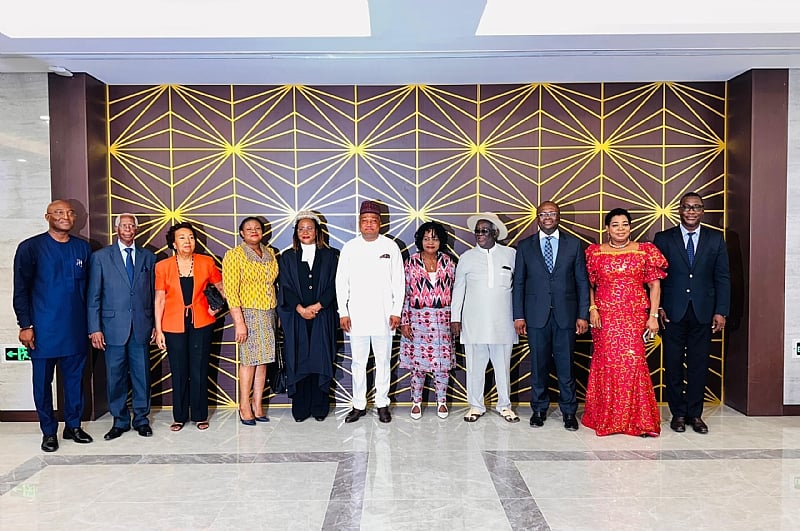Ministry of Foreign Affairs has inaugurated a newly reconstituted Ministerial Advisory Board in Accra.
Among others, the Board is expected to provide strategic guidance and enhance Ghana’s foreign policy framework, with a strong emphasis on economic diplomacy.
The advisory board will also play a critical role in shaping Ghana’s foreign policy by ensuring that decisions are well-informed, effective, and firmly aligned with the country’s national interests.
With expertise, spanning diplomacy, trade, security, and governance, the members of the advisory board will provide the Ministry with strategic insights to navigate complex global challenges while advancing Ghana’s priorities.
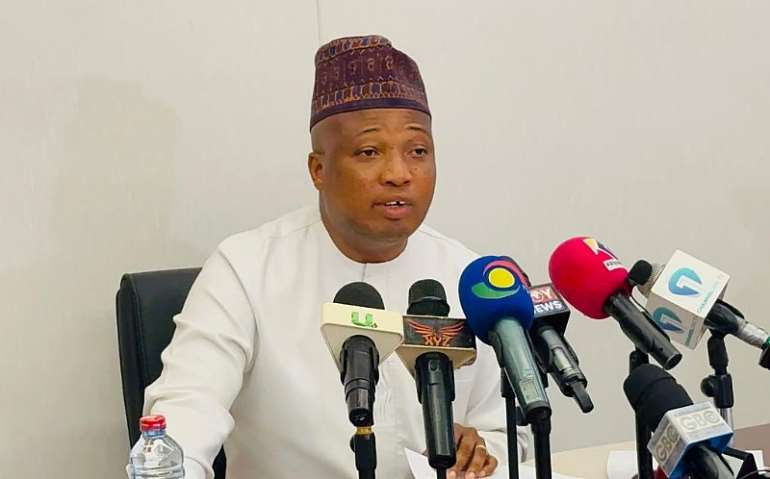
The Members include Mr Samuel Okudzeto Ablakwa, Minister of Foreign Affairs; Dr Cassiel Ato Baah Forson,
Minister of Finance, Dr Edward Omane Boamah, Minister of Defence; and Mrs Elizabeth Ofosu-Adjare, Minister of Trade, Agribusiness and Industry.
Others are Mr Ramses Joseph Cleland, Chief Director, Ministry of Foreign Affairs; Mr Francis Kojo Kwarteng Arthur, Chief Executive Officer (CEO), Ghana Export Promotion Authority; Mr Simon Madjie, CEO, Ghana Investment Promotion Centre; and Prof Kwamena Ahwoi, a former Foreign Minister.
The rest are Mrs Agnes Aggrey-Orleans, Chairperson, Association of Former Foreign Service Officers, Mr Chris Kpodo, a former diplomat, Madam Helen Adjoa Ntoso, Member of Parliament (MP) for Krachi West, Madam Queenstar Maame Pokua Sawyerr, MP for Agona East, and Mr Philip I.K.A. Johnson, Director, Policy Planning, Monitoring and Evaluation Bureau, Ministry of Foreign Affairs.
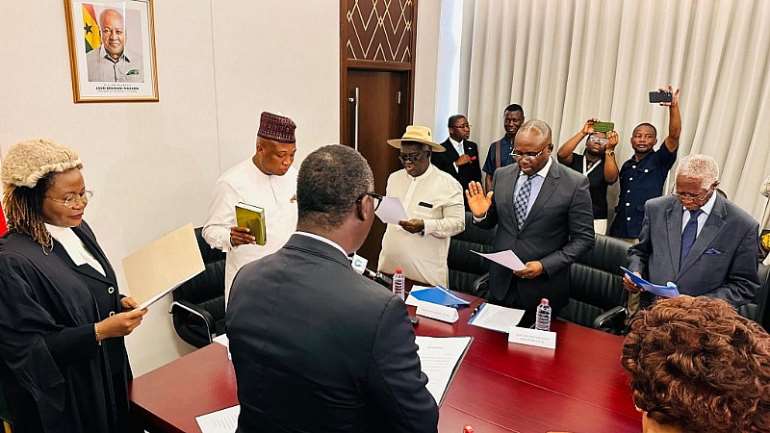
Justice Abena Asuamah Oppong, a High Court Judge, who administered the Oaths of Allegiance, Office, and Secrecy to the 13-member Board, reminded members of their legal and ethical obligations in safeguarding state interests.
Mr Samuel Okudzeto Ablakwa, Minister of Foreign Affairs, underscored the importance of the Board’s mandate under Section 39 (1) of the Civil Service Act, 1993 (PNDCL 327), which required periodic renewal to ensure continuity in policy formulation.
He highlighted the Ministry’s achievements, including the successful rollout of chip-embedded biometric passports, the establishment of a Mobile Passport Application Centre for Hajj pilgrims, and Ghana’s successful candidatures for strategic positions at the African Union Commission.
“Your appointment to this esteemed body is a recognition of your individual distinction and an expression of confidence in your capacity to contribute meaningfully to Ghana’s foreign policy objectives,” Mr Ablakwa said.
The Foreign Ministry outlined several key initiatives aimed at repositioning Ghana’s diplomatic efforts to drive economic growth, including the development of a Comprehensive Foreign Policy Framework and an Economic Diplomacy Blueprint, which seeks to transform Ghana’s foreign missions into hubs for trade, investment, and innovation.
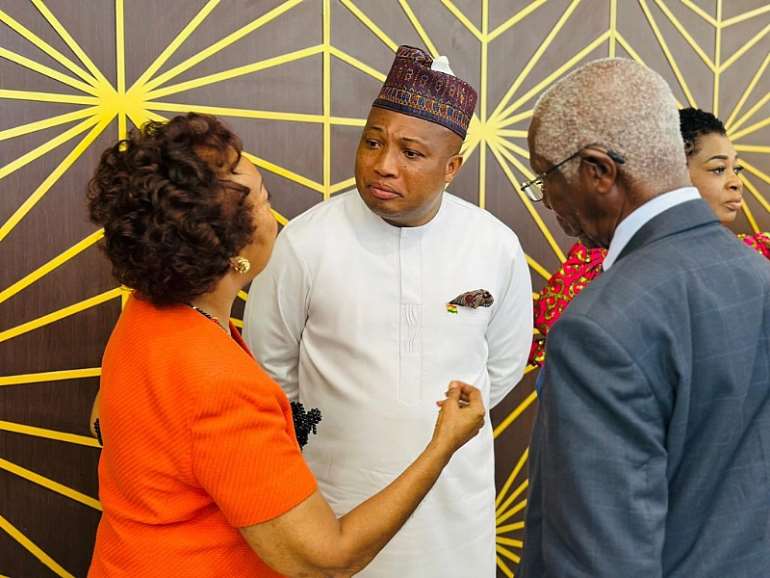
The Ministry, Mr Ablakwa disclosed, was implementing the Strategic Transition from Renting to Infrastructure Development (STRIDE) Initiative, a four-year plan approved by Cabinet, to acquire permanent state-owned facilities for Ghana’s missions abroad.
This initiative aims to reduce costs and enhance the operational efficiency of diplomatic missions.
Additionally, the Ministry has established a Delivery Unit to monitor the performance of Heads of Mission through Key Performance Indicators (KPIs), ensuring accountability and measurable outcomes in foreign service delivery.
Highlighting Ghana’s commitment to diaspora relations, Mr Ablakwa announced the formation of a Committee on Migration and the Welfare of Ghanaians Abroad.
The committee, the Minister said, would develop frameworks to protect the rights of Ghanaian diaspora communities and harness their potential for national development.
Speaking on behalf of the Board members, Prof. Kwamena Ahwoi, a former Minister for Foreign Affairs, cautioned members against breaches of their oath, particularly the oath of secrecy, warning that such actions could have catastrophic consequences as prescribed by law.
He stated, “We must uphold the highest standards of integrity and discretion in our deliberations to safeguard national interests.”
Prof. Ahwoi emphasised the enduring nature of national interest, irrespective of political changes, saying “When governments change, policies change, but there’s never a change in national interest.”
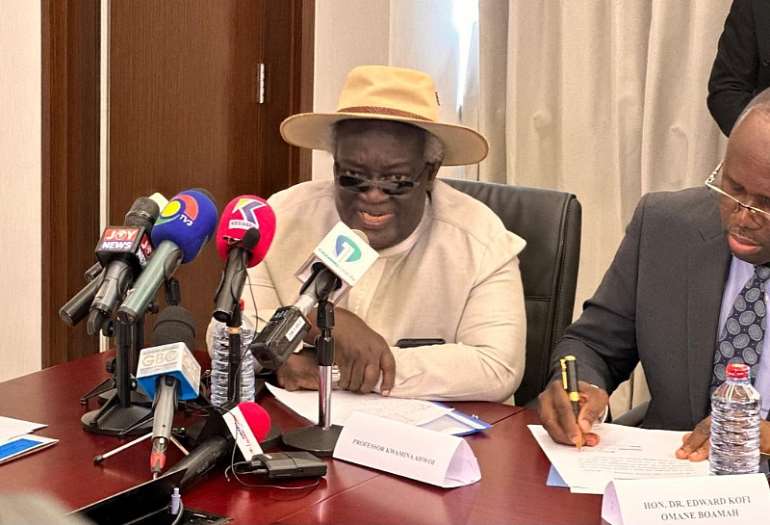
The former Foreign Affairs Minister said their collective duty was to work tirelessly to advance Ghana’s standing on the global stage, ensuring that its foreign policy remained consistent, resilient, and aligned with the nation’s long-term goals.
-GNA


